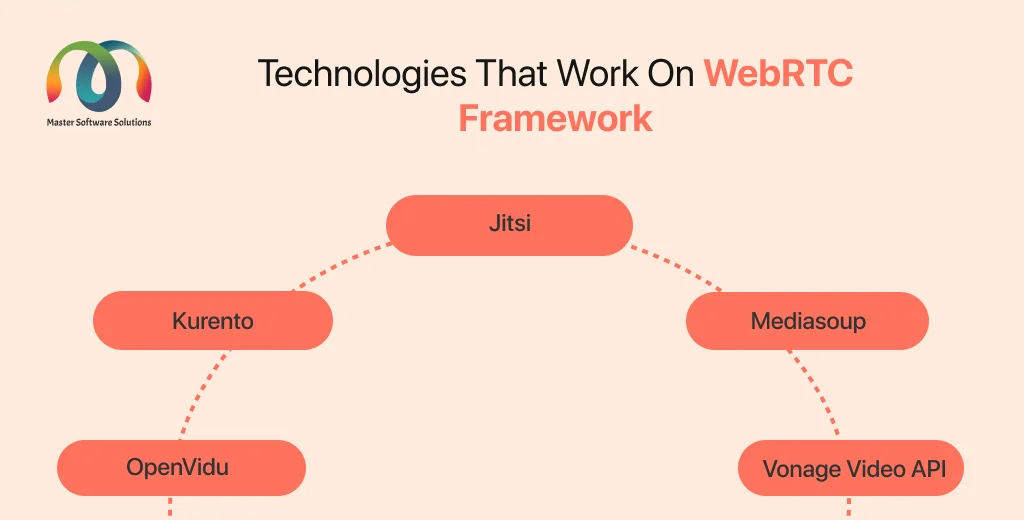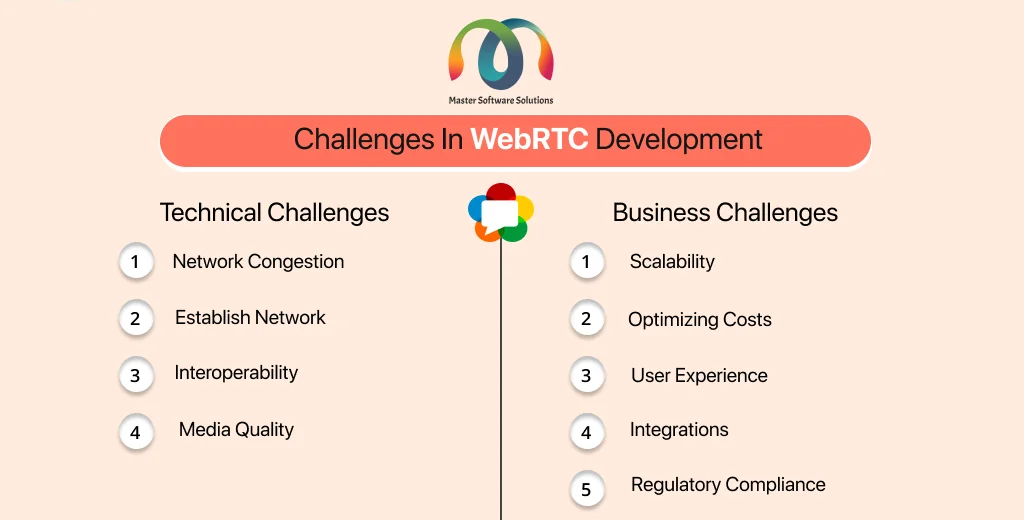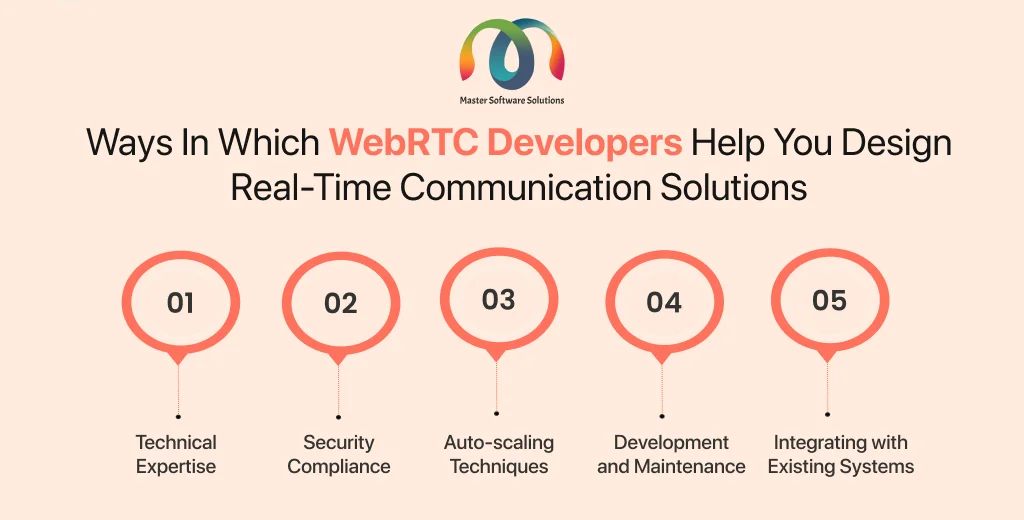WebRTC stands as a pioneer in the real-time communication landscape across various industries. WebRTC is an open-source platform that provides APIs and protocols for developers to design real-time communication solutions. It is a complex setup that requires the expertise and experience of a skilled WebRTC developer to create the best solutions.
With the intricacies involved in WebRTC development, you must have sophisticated development skills and in-depth knowledge about all the aspects included in the platform. This blog explores all the crucial elements you need while searching for a skilled WebRTC expert. The blog provides insights on how Master Software Solutions, the best WebRTC application development company, can be your great option.
This blog covers;
What do WebRTC developers do?
WebRTC real-time communication development involves complex programming, integration, and customizations needing expert skills. You need people with the relevant expertise to avoid extra costs and delays in time-to-market launches. This is where WebRTC developers come into the picture.
WebRTC developers are the experts who have extensive knowledge and expertise in WebRTC technology. They understand the complex nature of the technology and have the skills to work through it. These expert developers can help you seamlessly migrate WebRTC app development challenges, saving you from extra workloads and fastening the launch-to-market time.
Is WebRTC free or paid?
A WebRTC platform is open-source software freely available over the Internet. It provides APIs and protocols to design real-time communication solutions without integrating third-party APIs or plugins. Although WebRTC is free, you must have the appropriate skills and knowledge to create robust real-time communication solutions.
Many developers have successfully created ready-to-use technologies using the WebRTC framework. This has further advanced the functionalities of real-time communication solutions. Some of such technologies are:
Jitsi– The Jitsi platform uses WebRTC to allow Jitsi developers to develop video-conferencing applications.
Kurento– The Kurento is an open-source media server that allows Kurento developers to develop advanced solutions for group communications, transcoding, recording, mixing, broadcasting, and routing audiovisual flows.
Mediasoup– The Mediasoup is a WebRTC-based media library that allows Mediasoup experts to create scalable real-time communication solutions.
OpenVidu– OpenVidu is a platform that facilitates the integration of a video calling platform into your application or web without disturbing the code.
Vonage Video API – The Vonage video API was formerly known as TokBox. It provides APIs for real-time, high-quality interactive video calling, messaging, and other functionalities in your web and mobile applications.
What are the challenges in WebRTC development?
WebRTC application development involves varied challenges due to the complexities of real-time communication, variable network conditions, and the need for interoperability. These blockers can impact the quality of audio/video calling and platform scalability. The challenges in WebRTC development can be technical and business challenges. We’ll understand these challenges individually, one by one.
Technical challenges
Network congestion – It is difficult to establish reliable communication in diverse networks. It can lead to latency, affecting the quality of audio and video streams.
Establish network – It is complex to establish a network and navigate through Network Address Translation (NAT) for peer-to-peer connections. It often requires additional infrastructure like STUN and TURN servers.
Interoperability – Consistent high-quality performance and feature support on multiple browsers are time-consuming to implement but crucial.
Media quality – You need to carefully optimize codecs, bitrates, and other media processing settings to improve the quality of audio/video media, especially in low-bandwidth environments.
Business challenges
Scalability – Designing real-time communication applications that can handle large numbers of users and scale themselves during high traffic can be demanding.
Optimizing costs – Managing resources like media servers is challenging, especially while finding the right balance of high performance and cost efficiency for cloud-based deployment.
User experience – Designing intuitive applications to offer a seamless user experience is crucial. You need extensive skills to integrate features like screen sharing, recording, and virtual backgrounds without compromising performance and usability.
Integrations – It is complex to integrate the WebRTC platform with your existing systems. You need to have a deep understanding of both WebRTC and the systems you are integrating with.
Regulatory compliance – You should know industry-specific regulations, such as HIPPA for healthcare or GDPR for data protection, or else it can pose additional technical and administrative requirements on your business.
How can hiring a WebRTC expert help with these challenges?
WebRTC experts are the developers who are proficient and have appropriate skills and expertise. You can hire WebRTC developers to design real-time communication applications for seamless and uninterrupted connectivity. Ways in which WebRTC developers can help you design real-time communication solutions:
Technical expertise
- WebRTC developers understand the complex nature of the platform and have the skills to optimize applications and handle high network traffic with the least latency. They can implement adaptive bitrate, correct errors, and handle jitters to ensure high media quality across various network conditions.
- The developers can efficiently navigate via NAT and firewall issues. They can manage STUN and TURN servers to ensure peer-to-peer connection even in low network environments.
- WebRTC experts can assist you in achieving high-quality audio and video in low bandwidth. They have expertise in handling codec configurations and media handling to improve media quality and reduce resource usage.
Security compliance
- WebRTC experts can implement powerful encryption and secure keys to prevent unauthorized access and vulnerabilities.
- They are familiar with industry-specific regulations, ensuring that the solution adheres to necessary legal and compliance standards to safeguard user data and avoid potential legal issues.
Auto-scaling techniques
- WebRTC experts can help you create the architecture of your application, allowing it to scale efficiently through load balancing, signaling, and media server distribution. This enables your system to handle traffic without affecting performance.
- They can help you achieve a balance between performance and costs. The developers have the skills to optimize resource allocation, choose the right cloud service, and implement autoscaling strategies to reduce operational costs.
Development and maintenance
- Developers can accelerate the development process, reducing launch-to-market time. They know the potential issues that might arise and can solve them on time.
- WebRTC experts know how to use debugging and testing tools to identify and resolve issues before they impact the user experience.
Integrating with existing systems
- WebRTC experts have the required expertise to integrate WebRTC’s existing systems, such as VoIP infrastructure, CRM systems, or legacy platforms.
- They ensure smooth integration, enhancing the functionality of your existing systems.
How can hiring a WebRTC expert help with these challenges?
Identifying the right WebRTC developers requires evaluating their expertise, knowledge, and experience. WebRTC developers should have a combination of technical and soft skills, like a problem-solving attitude. Some of the ways you can assess the skills of WebRTC developers are discussed below.
Technical skills a WebRTC developer should have are:
- Understanding of WebRTC APIs (getUserMedia, RTCPeerConnection, and RTCDataChannel).
- WebRTC Protocols (SDP (Session Description Protocol), ICE (Interactive Connectivity Establishment), STUN (Session Traversal Utilities for NAT), and TURN (Traversal Using Relays Around NAT)).
- Media Handling (audio, video, and screen sharing)
- Programming languages (JavaScript/TypeScript and for backend—Node. js, Python, or Go).
- Frameworks and libraries (Jitsi, Socket.IO, Janus, or Kurento).
- Security protocols (DTLS (Datagram Transport Layer Security) and SRTP (Secure Real-time Transport Protocol)).
- Signaling experience (WebSocket or HTTP-based signaling).
- Debugging tools (internals or Chrome’s WebRTC diagnostics).
- Performance optimization ways (bandwidth management, latency reduction, and ensuring smooth audio/video quality)
Soft skills a WebRTC developer should have:
- Problem-solving – The developers must understand the complexity of the platform and know the possible challenges they might face while designing the solution. They should know how to solve WebRTC issues like connectivity problems, audio/video synchronization, or scalability.
- Communication – The WebRTC developers must have excellent verbal skills to convey technical and non-technical aspects of the platform to the stakeholders.
How can Master Software Solutions help you design real-time communication solutions?
Master Software Solutions is an IT service-based company with more than 9 years of experience in WebRTC application development services. We provide end-to-end real-time communication solutions for various industries, including media and entertainment, legal services, finance, ed tech and e-learning, and telehealth. Discuss your business with experts and see how we can help you.



